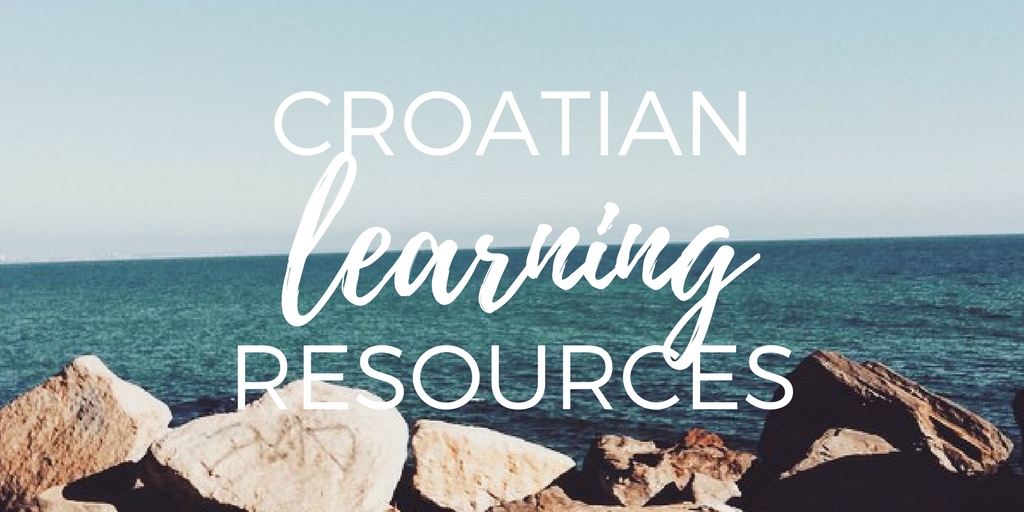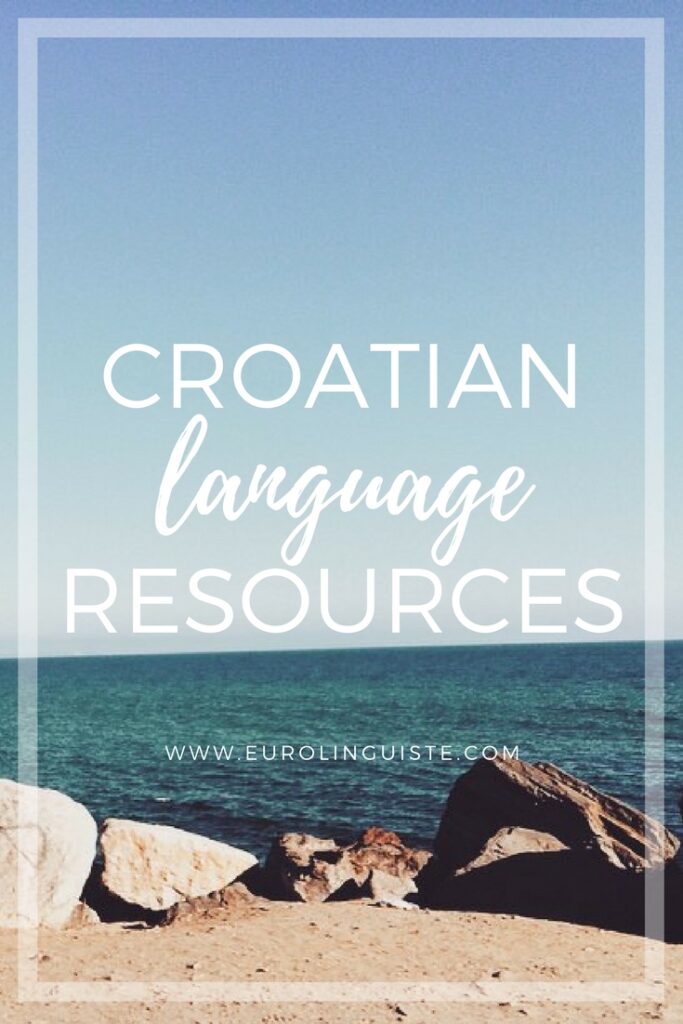Croatian Language Resources
This page is a work in progress. Please feel free to suggest resources that have worked for you in the comments.

I first started studying Croatian seriously in 2013 primarily because I wanted to share a connection through language with that part of my family, to help Mini M develop his skill in the language, and as a gateway to Russian.
It’s a beautiful language that has some of the musicality one might associate with Italian while still maintaining its obvious Slavic roots. Finding resources for learning the language has been somewhat more difficult than it has been for some of the more “popular” languages such as French, Mandarin, Italian and German, so I’ve assembled this guide to share some of the books and language learning materials I have used and found to be effective.
The Croatian Language

The Croatian language, hrvatski, is the official language of Croatia and has close ties to the languages spoken in Bosnia and Herzegovina, Serbia, and Montenegro. One could, in fact, argue that the above are so similar they might be considered the same language otherwise referred to as Serbo-Croatian. A major difference, however, is that Croatian is written in the Latin alphabet while Serbian is written in the Cyrillic alphabet (it is becoming more and more common, however, for Serbian to be written using the Latin alphabet).
There are four main dialects of Croatian, Chakavian, Kajkavian, Torlakian, and finally, Shtokavian. The dialect referred to as “Standard Croatian”, or the closest to it is said to be Ijekavian (thanks to Daniel N. for this tidbit). There are approximately 5.5 million native speakers around the world.
So why would you want to learn Croatian? Well, that’s entirely up to you. I believe don’t that choosing languages for “practical” reasons is as effective for learning as choosing a language because you want to learn it. I suggest the same for you. For me, Croatian was a language I desired to learn for personal reasons. That alone gave me plenty of motivation to work at it. Plus, I really enjoy speaking it.
Hear the Croatian Language
So, let’s look at a few resources you can use to help learn Croatian.
How to Decide Which Croatian Language Resources to Pick
Language learning texts and resources can get real expensive real quick. So rather than going at it randomly or by trial and error (which you’ll probably have to do some of anyway), I’d like to make a suggestion first.
The ability to use and understand a language is based upon four basic abilities: reading, writing, speaking, and comprehension. Depending on what your goals are, all four may not be necessary.
Let’s say, for example, you hope to take a trip to Dubrovnik in six months. What language skills will you need? Basic communication and comprehension and basic reading (street signs, etc). You probably won’t ever have to write in the language. So, in this case, you might focus on developing your speaking and listening skills. If this sounds like you, I suggest checking out the audio or audio/text resources and the online resources below.
On the other hand, maybe your goal is to read Croatian literature. In that case, learning to speak and understand the spoken language aren’t necessary and you can dedicate your energy to text. If this describes you, I suggest checking out the text and online resources below.
Ideally, you should probably develop some skill in each area, but the areas you focus on need to align with your goals regarding the language and how you plan to use it. I highly suggest picking resources based on this alone. Don’t get distracted with the temptation of shiny, new books (like me) and only buy materials you think you’ll actually use. You’ll save yourself a headache and a lot of money. Money that you can put aside for a trip to Croatia!
A Few Things To Consider Before Taking on Any Language
- What is your motivation behind learning Croatian? Take a moment to write down your language learning goals. It increases the odds of you achieving them. You can also join us as part of our Clear the List goal setting linkup!
- How many hours a day are you willing to study a language? Set realistic expectations for your progress.
- How do you plan on studying Croatian? Are the methods that work for you available?
- You should setup up the Croatian language keyboard on both your computer and your phone. It will help you with spelling and make chat easier on Skype/HelloTalk/etc.
- Be accountable. I keep my blog to help me be more accountable and use other apps to keep track of my daily study.
Audio Resources
- Get By in Croatian // My Croatian language learning podcast available for free on iTunes.
- Pimsleur // You can try a Free Lesson here
- Librivox // get audiobooks read to you in your target language for free!
- TuneIn // Croatian Language Radio
Audio & Text Resources
- Assimil // My favorite course book for all languages. Unfortunately, the Croatian book is only available for those who speak French at this time.
Text Resources
- Introduction to the Croatian and Serbian Language – Not the BEST textbook I’ve ever used, but it works for me.
- Harry Potter in Croatian
- Game of Thrones in Croatian *read what you love in the languages that you’re learning!
- You can also try filtering the Amazon Book search results to Croatian – Croatian Books on Amazon
- Lang-8 // Get your writing in your target language corrected by native speakers.
- 100+ Conversational Words & Phrases in Croatian
Online Resources
- The Fluent in 3 Months Bootcamp // The last few years, I’ve done the Fi3M Bootcamp for every new language I’ve studied. I’ve also participated in several of my other languages. It’s a 90-day program that helps you get to a 15-minute conversation in your new language as a part of a community with personal coaching.
- iTalki // A great site where you can find language tutors or language exchange partners.
- Drops // Interactive, visual language learning with tons of fantastic, well-curated vocabulary lists.
- Speak in a Week // Another great resource from Benny Lewis that gets you speaking your target language quickly.
- Clozemaster // A fun game where you use cloze, or fill-in-the-blank, to learn new vocabulary.
- Children’s Library
- Free Regional Television
- Tatoeba // sentences translated from any language in Croatian
Video
This series has been extremely helpful for me:
Music
One of the best ways to learn a language is to listen to music in the language. It not only helps with improving one’s accent, but it also can increase overall comprehension. Plus it’s fun to translate the lyrics of your favorite songs. Here are a few artists I enjoy.
- Foreign Language Music Blog – a great blog with music in various foreign languages with lyrics and their translations
Culture
Learning about the culture that is tied to the language you’re learning is so important – the more you love the culture, the more you’ll love the language and vice versa. Discovering a new culture also enriches your life, particularly if it’s one quite different than your own. I highly recommend it if you haven’t started already!
Here are a few books on the history of Croatia and it’s culture. You can also check out television shows or movies. I don’t suggest cartoons or films for kids because a lot of the language is often invented and you won’t get as much from it as you might from a drama geared towards an older audience. But if cartoons are your thing, go for it!
- For an interesting perspective on the Croatian/Serbian linguistic divide, read this article
- Culture Smart! // A great series with introductions to various cultures around the world. For Croatian, you can get started with Croatia.
- Christmas in Croatia // How Christmas is celebrated in Croatia plus vocab and a recipe for Walnut Bread.
Related but Not Specific to Croatian
- Learning Less Popular and Minority Languages When Resources Are Hard To Find
- Cases | What This Word Means for Language Learners
A Quick Note
If you’ve been learning Croatian, I’d love to hear about your experience and some of the language learning tools you’ve found helpful. Please leave me a note in the comments! The same goes for if you have any questions. I will be more than happy to respond and I look forward to hearing from you!


